Archive for the 'Oranges' Category
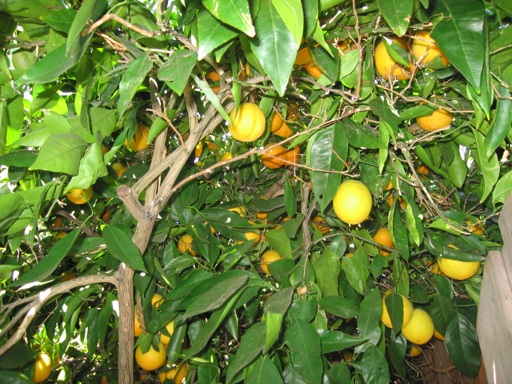
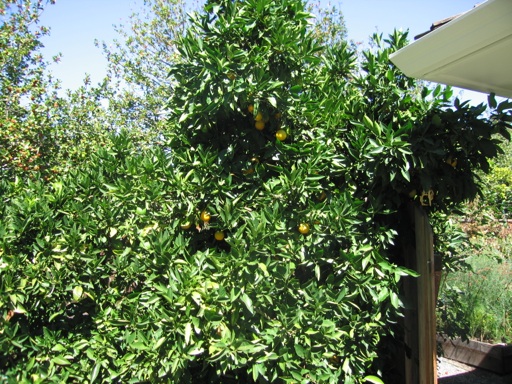
The valencia orange tree in our yard has hundreds of oranges on it this year. Although most of the oranges are small, it’s still the largest harvest it has ever had. Most of the oranges are hidden under the leaves. So it seems that there’s not much fruit one tree until you look past the outer layer of leaves. I’ve picked several dozen already, and I have barely made a dent.
These valencia oranges ripen in mid-summer in our climate and are good through fall. They might even last on the tree into winter, although I have never left ripe oranges on the tree that long. They’re a nice counterpart to navels, which are seasonal in winter and spring.
As I said in my older posts on this tree, I juice most of the oranges I harvest from this tree. There are too many to eat individually. These oranges last on the tree into November without losing any noticable quality. This year, I may be testing if they will last on the tree into December, which will be a first. I’m not sure how the ripe fruit will fare after the first frost, which typically occurs here in December. Although this tree and its unripe green fruit have survived two winters in a row that both had cold spells down to about 27 degrees F without experiencing any freeze damage.
September 13 2013 | Oranges | Comments Off on Valencia Orange Tree
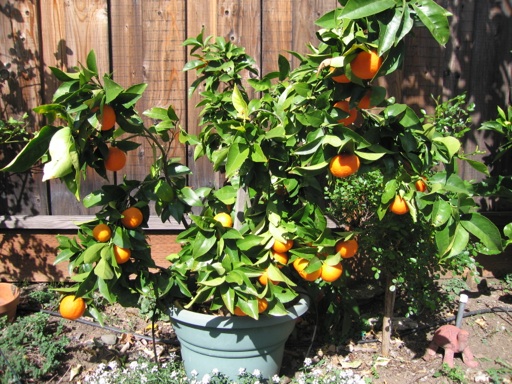
This is a photo of a page mandarin orange bush we have growing in pot. I had this plant growing in the ground for years, but it always looked unhappy. It grew very little and had yellowing leaves and few fruits, despite repeated applications of fertilizer. It was growing in a spot where it had root competition from larger bushes.
After I transplanted it into a pot, it started growing, greening, and blooming. It was full of fruit, and we have been enjoying them for the past month. They have a very good flavor. I purchased this particular variety, page mandarin, because some people have written that it is one of the best mandarins. The flesh of the fruits are a bit chewy like most mandarins, but they are much more tender than some other varieties like Satsuma.
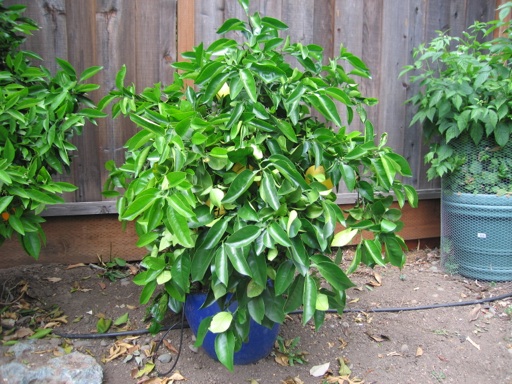
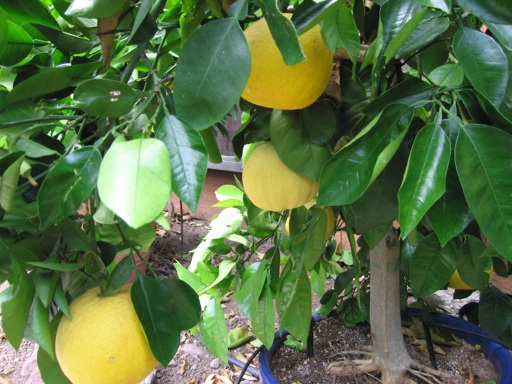
These are current photos of our potted Oroblanco citrus. It has grown very well in the past two years since we bought it, even though its pot is small compared to the size of the plant. It is full of fruit this spring. It has about 15 Oroblanco fruits, which is a lot of fruit for a plant this size. As you can see from the second picture, each fruit is big, about the size of large grapefruit. Last year, our Oroblanco produced a few fruits, but they were sour, bordering on inedible. So far this year, the fruits have been sweet and tasty. The flavor is dramatically better than last year. Perhaps the warm weather we’ve had this spring has been the cause.
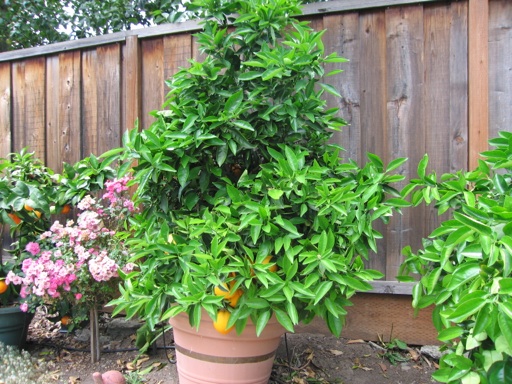
This is a current photo of our potted Washington navel orange bush. It has grown rapidly since I transplanted it into a pot a few years ago. It was loaded with fruit about a month ago. I’d estimate this small bush had over 2 dozen oranges. We have already eaten about half of them. They usually just fall to the ground when they are ripe. Its oranges are very large in size, but the flavor is not quite as good as the much older navel orange bush we have growing in the ground in another part of the yard.
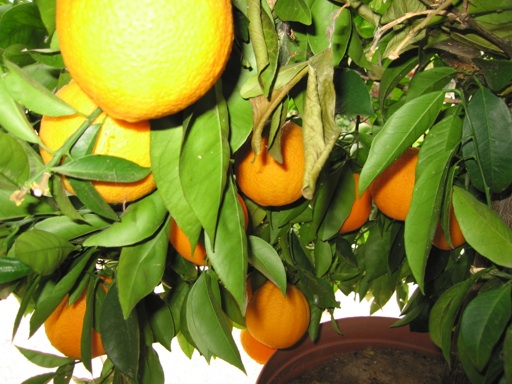
May 07 2013 | Mandarins and Oranges and Oroblanco | Comments Off on Citrus in Pots
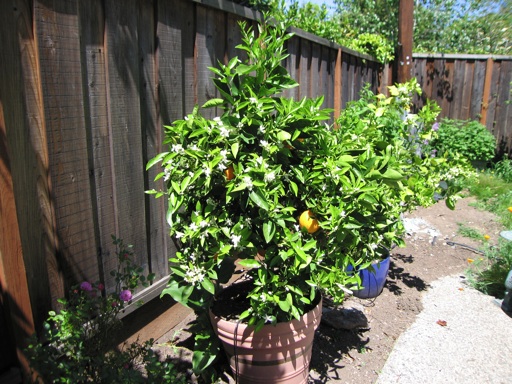
This is a photo of a Washington navel orange bush that I used to have growing in the ground. It is the same plant that I wrote about in a post two years ago complaining how it was dropping leaves when I fertilized it. I later talked to a citrus grower who convinced me that it was dropping leaves, because I watered it too much after I fertilized it. I didn’t think I was overwatering it, but it occurred to me that the ground there may not be draining quickly because of its clay-like soil. I figured our orange didn’t like that spot, because when I did irrigate it, the water may have been sitting there too long.
So I dug the plant up and transferred it to a large container. Since I moved it to the container, it has thrived. It hasn’t dropped leaves like it did when it was growing it the ground. Instead, it has grown considerably, and its leaves are a healthy looking dark green color. Just in the past few weeks, it has developed a flush of new green growth, and it is full of blossoms. It also has about 10 large fruits on it that are nearly ripe. It obviously likes being in the pot better than in the ground, and I think it’s because the pot drains water more effectively. Although, it does need more frequent watering in the container.
I also have a small page mandarin orange bush that I had growing in the ground in a different part of our yard for a few years. While it was in the ground, it often dropped many of its leaves like the orange. It also had many yellow leaves even after fertilizer applications, and it didn’t grow much. Last year, I transplanted it to a container. Since then, I’ve noticed it improving. It’s growing more, it’s not dropping leaves, and its leaves are much greener now than they were when it was growing in the ground. It’s also just beginning to bloom now.
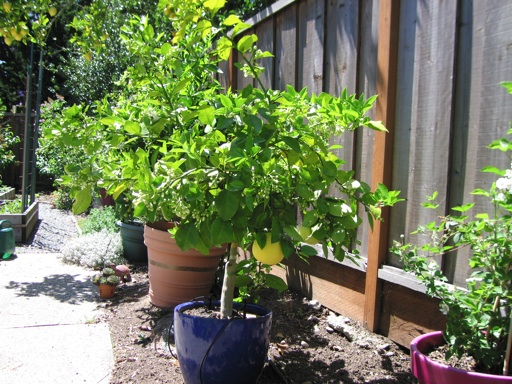
This is a photo of an Oroblanco citrus bush we have growing in yet another container. We bought it from a nursery just over a year ago. It has two fruits on it, which I am anxious to taste. So far it also seems to be doing well in a pot.
Last winter, the temperature here dropped down to 26.5 F on two nights, but none of our citrus plants had any noticeable signs of freeze damage. Even the three citrus bushes we have in pots which were outside and uncovered didn’t show any damage from the freezing weather. So far, the orange fruits I have picked are also not showing freeze damage. Cold damaged citrus typically has dried out pulp.
April 21 2012 | Oranges and Oroblanco | Comments Off on Citrus in Containers
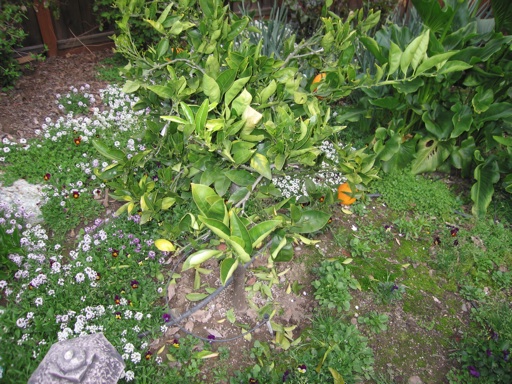
A few weeks ago, I gave our citrus bushes their first application of fertilizer for the season. I have read repeatedly how important it is to fertilize citrus with nitrogen especially in late winter to stimule them to grow and bloom in the spring. I have been using a 16-16-16 all-purpose chemical fertilizer on our citrus. We have two mature orange bushes (below picture), a very small page mandarin bush, and a small navel orange bush (picture above). A week after I applied the fertilizer, the mandarin and the small navel orange bush dropped many of their still green leaves. The picture above show the small navel orange after the leaf drop occurred.
I gave the small orange and mandarin about a cup of fertilizer each, which was probably too much. We had only a few light rain showers in the weeks after I fertilized, and I did not give them supplemental watering. Also, the weather has been cool with many cloudy days in the past few weeks, but we have not had any freezing weather. So I can rule out overwatering and weather conditions as possible causes. Last spring, our small orange lost even more of its leaves within a few weeks after I applied the same fertilizer.
Although leaf drop on citrus can occur for a variety of reasons, I am convinced at this point that the leaf drop has been occurring, because I have been applying too much fertilizer, which burned the roots. I have decided to start using an organic fertilizer on our citrus bushes and to use much less fertilizer, perhaps a third of a cup per application on our small bushes. I have read that organic fertilizer is less likely to burn the roots than chemical fertilizers, because the nutrients in them are much less concentrated. Our mandarin seemed to suffer the most after I gave it fertilizer. That’s strange because it had many yellowing leaves that were a clear sign of nitrogen deficiency. However, it is a very small bush (only about 18″ high), so it was probably more susceptible to root burn.
Our large mature orange bushes did not mind the chemical fertilizer. I gave them about 3-4 cups of fertilizer each. They lost very few leaves after I applied the fertilizer, which seems to confirm what I have been reading that mature trees can handle large doses of fertilizer much better than young trees. In the past few years after giving our 2 large orange bushes a few cups of all-purpose fertilizer in February, they responded by producing an abundance of blossoms and new dark green leaves the following spring.
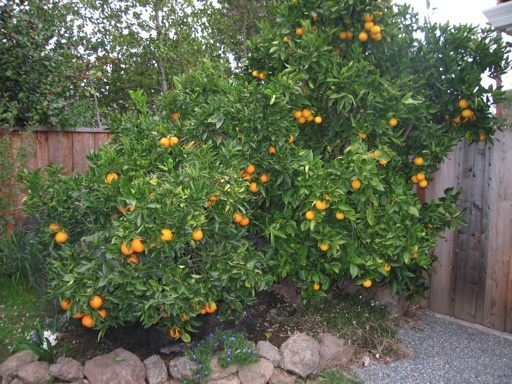
March 07 2010 | Oranges | Comments Off on Leaf Drop on Citrus
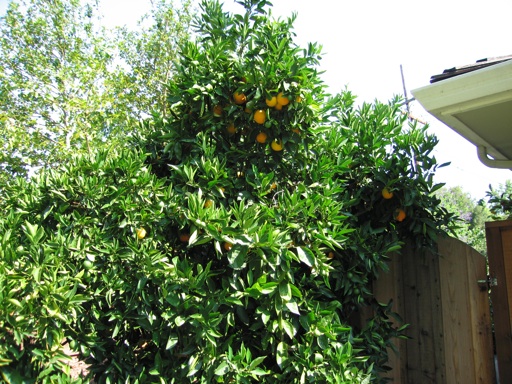
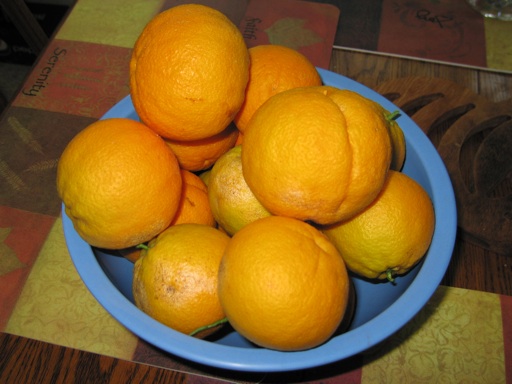
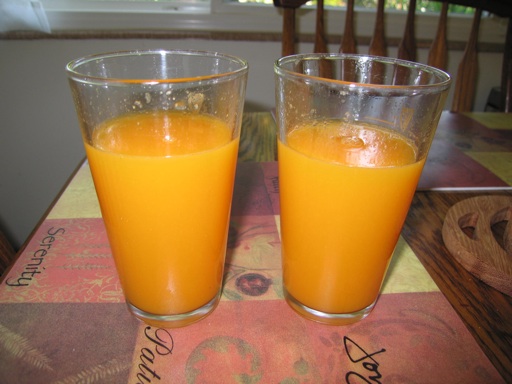
The house we live in came with mature valencia and navel orange bushes. The navel oranges ripen in the spring. The valencia oranges ripen in the summer, right in the middle of the fruit season for so many other plants we have growing in our yard. Because we are so busy eating other fruits, we often leave many of our valencia oranges on the bush for months after they are ready to pick. Valencia oranges can hang on the branches for months after they are ripe without losing quality or rotting. Sometimes I leave some of the fruit on the bush until October early November.
Our valencia bush typically produces over 100 fruits each year. This year it has about 200 oranges. They are good for eating fresh, although they are not as tasty and sweet as the navel oranges. We use most of our valencias to make fresh squeezed orange juice, which is so good. I usually add a teaspoon or two of sugar to each glass to make it extra sweet. I squeezed about 8 oranges to make the two glasses in the bottom picture.
Oranges are tricky plants to get established. In order to get oranges to thrive, they need lots of nitrogen rich fertilizer, applied in the late winter and spring. And in my opinion, they also need regular watering.
I have planted several oranges, because I wanted to try new varieties, and because I wanted another navel. Most of the young oranges I planted have died. Several of the young oranges I planted died as soon as their root balls dried out in the summer. The mature oranges we have are better able to tolerate dry periods than the recently planted oranges. My theory on oranges is to keep them well-fed and well-watered, just not saturated or water logged. I have read many posts on other sites claiming that oranges like to dry out between waterings. That technique has never worked for me.
August 09 2009 | Oranges | Comments Off on Valencia Orange Juice
Next »













